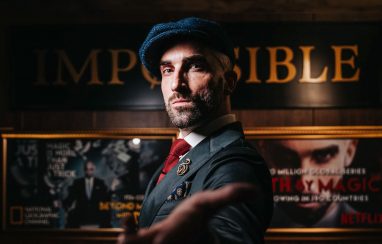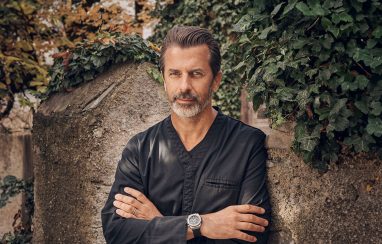By Giorgos Tsiros
It’s not often that a film receives applause from the audience 11 years after its release, but that’s exactly what happened at the Danaos Open Air Cinema of Navarino Agora on the last Sunday of June, following a special screening of “Before Midnight,” the third part of Richard Linklater’s beloved film trilogy, introduced by none other than Julie Delpy, the films’ protagonist and Academy Award – nominated co-writer.
The trilogy tells the romantic story of Jesse and Céline through two decades of their lives: from their meeting as twenty-somethings on a train to Vienna (“Before Sunrise,” 1995) to their reunion in Paris where Jesse, now an author, travels to promote his book (“Before Sunset,” 2004), and finally, on a family vacation in Messinia where as forty-somethings with children, they try to keep the romantic flame alive.
“The Before Trilogy serves as a document of a boundary-pushing and extraordinarily intimate collaboration between director and actors, as Delpy and Hawke imbue their characters with a sense of lived-in experience, and age on-screen along with them,” notes Criterion Collection, on the back cover of the trilogy’s special edition DVD box set. “Attuned to the sweeping grandeur of time’s passage as well as the evanescence of individual moments, the Before films chart the progress of romantic destiny as it navigates the vicissitudes of ordinary life.”
Julie Delpy has deep ties with Greece and Costa Navarino. Here, she met her husband Dimitris Birbilis, who was the location manager for the film. Since then, she returns for holidays every summer without fail (“except for 2020, due to the pandemic,” she clarifies). “This area of Greece is wonderful, and what I like is that it’s not overcrowded like other areas, where it becomes difficult to enjoy yourself. There is a certain quality here, and I appreciate that,” she says. “We visit the waterfalls at Polylimnio, and we also go swimming at Voidokilia. Every year we have such a great time; it’s a wonderful place to come back to. There were times when we discussed, ‘maybe this year we should try something different?’ but we always end up here, at least for a week.”
Later, at the screening, Delpy jokingly asked the audience if we had already seen “Before Midnight” and, obviously, most hands were raised (personally, I’ve seen it three times). “So you know what to expect,” she laughed. The film (as well as the entire trilogy) not only withstands the test of time but continues to evoke strong emotions. Especially in the scene of three different generations gathered around the lunch table at Patrick Leigh Fermor’s house in Kardamyli, with Xenia Kalogeropoulou’s heartbreaking monologue on love and loss and the late, great Walter Lassally (director of photography for “Zorba the Greek”) as the host, there were few dry eyes left.
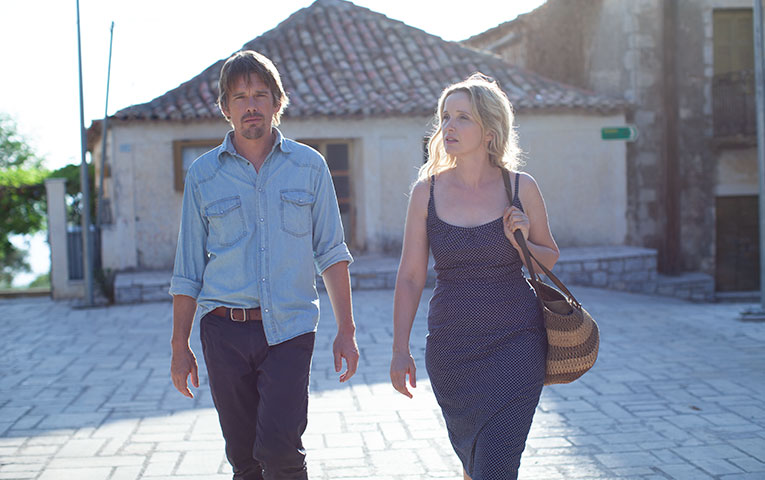
It’s always good news when a cinema opens, and this one is the most fitting for this particular film, isn’t it?
Yes, it’s fantastic! It’s the perfect movie for an open-air cinema, especially since it was filmed in this area.
Nothing compares to watching a movie with an audience in its natural setting, do you agree?
I love going to the cinema. My problem is that sometimes you don’t find such good options because mostly these “big” movies are shown, which are not necessarily aimed at adults. I like to watch good films for adults in the cinema, and I do it as often as I can. The distribution system complicates things a bit, but it’s still feasible. Especially with comedies, nothing compares to watching them in the theater, laughing with all the other viewers. Honestly, I enjoy watching comedies in the theaters!
Before Midnight is one of the most important milestones in your career and also initiated your very close relationship with Greece. Was it meant to be that Greece and the southern Peloponnese were chosen for Celine and Jesse’s vacation instead of another destination?
The interesting thing is that I was a bit nervous to come to Greece at that time, in 2012, during the crisis. I kept asking: Will we be okay with the filming? I travelled to Greece and realized that the crisis was of course real and it was difficult for many people but the news was giving the impression to the rest of the world that there were street battles every day, everywhere which wasn’t the case. We travelled down here, to Messinia, and everything was so beautiful… We were visiting locations for filming, returning to the hotel to continue writing the script, and then sometimes at the end of the day we also got to jump in the sea. It’s a lot of work writing all day with a dead line, but the place and the people made it a beautiful experience and the perfect place to shot Before Midnight!
And this for ten whole weeks, meticulously crafting every word and comma? That sounds grueling.
No, not at all. We had already sketched out a draft a little while before and came here for ten weeks of intensive writing. Writing is demanding work, but when you enjoy it… it’s also fun. For me, it’s more difficult to do something like a photo shoot or a public appearance. Of course, it was a challenge to make the script work, in just a few scenes, with this couple who have their issues, but it wasn’t unpleasant at all.
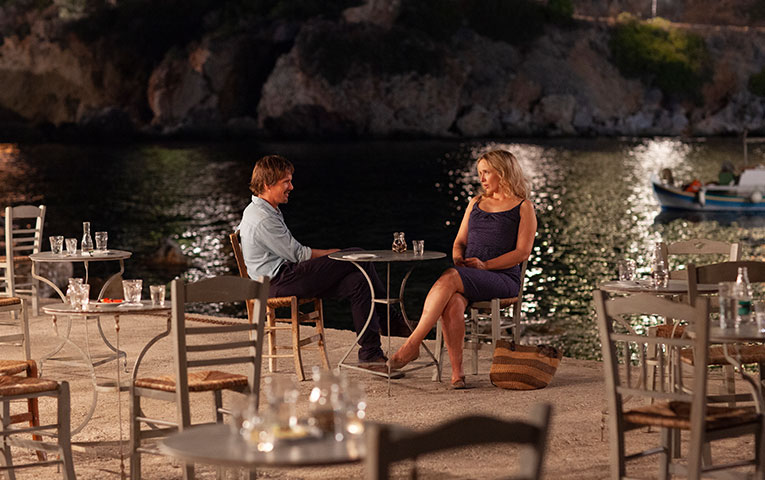
I was recently rewatching a Condé Nast Traveler feature on the film’s locations, with comments from co-producer Sara Woodhatch. They were crucial for the artistic and dramatic result of the film, weren’t they?
Yes. And it was perfect that we could visit them while writing, walking in the characters’ footsteps and constantly adding new ideas. We did the same with the first two films.
The “Before…” trilogy marked my generation in a profound and much more significant way than the ticket sales. How do you explain the appeal of this story and these two characters, so many years later?
We worked hard to make the characters as real as possible. To tell you the truth… I was reading a diary I kept when I was 18 years old, and a lot of what I wrote then about love ended up in Before Sunrise, the first film. It’s kind of funny how hopelessly romantic I was! I discussed it with Richard after reading the initial script, and he said, “okay, we’ll change it all,” which I found fantastic because the film had to speak about emotions, not just be about two young people walking around and telling stories about this and that. Both Ethan and I and Richard were ready to explore these emotions, two young people connecting… to dive into the meaning of love. So we worked on the first script, which was very important to introduce the characters and establish how deeply romantic their connection was.
I wonder, have many people come to tell you they fell in love with Celine from the first movie?
No, but they have come to tell me that they fell in love in general because of these films. Or they decided, after seeing the second film, to reconnect with an old lost love. The first film wasn’t that commercially successful, but the fact that we made the second and the two characters reunited seemed to spark something… And many people began to relate. I met many who told me, more or less, that they are married with children because the second film made them think about finding the person they had truly loved years before.
From the first movie, a lifetime has passed at least in terms of how we communicate… Jesse and Celine met before social media, before dating apps, before we all developed collective attention deficits and forgot the art of conversation. Today, how would two strangers meet and fall in love on a train?
The idea of desperate romantic love against the odds, losing someone for months and missing them, doesn’t exist because now you exchange emails and accounts and reconnect easily, meet up, have sex, it might progress, or it might not… But I don’t believe people have lost the ability to fall in love, that they have lost their romance. I believe it’s something they yearn for, and that’s why these films resonate with younger generations as well. People truly long to experience a romantic story.
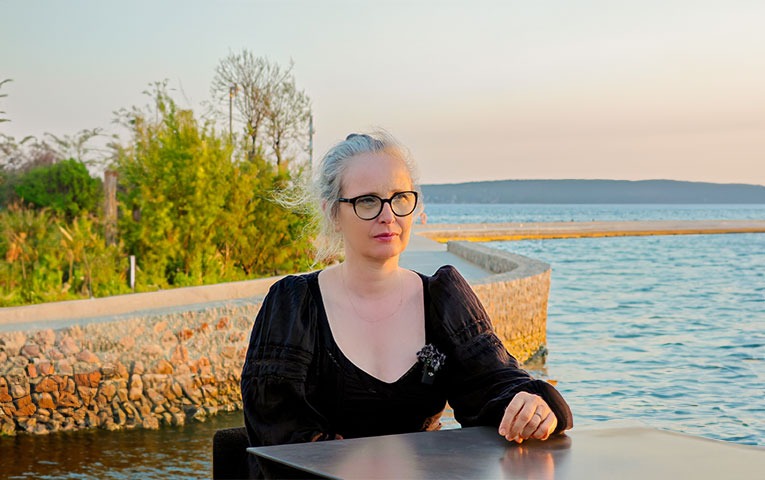
I was recently rewatching a Condé Nast Traveler feature on the film’s locations, with comments from co-producer Sara Woodhatch. They were crucial for the artistic and dramatic result of the film, weren’t they?
Yes. And it was perfect that we could visit them while writing, walking in the characters’ footsteps and constantly adding new ideas. We did the same with the first two films.
The “Before…” trilogy marked my generation in a profound and much more significant way than the ticket sales. How do you explain the appeal of this story and these two characters, so many years later?
We worked hard to make the characters as real as possible. To tell you the truth… I was reading a diary I kept when I was 18 years old, and a lot of what I wrote then about love ended up in Before Sunrise, the first film. It’s kind of funny how hopelessly romantic I was! I discussed it with Richard after reading the initial script, and he said, “okay, we’ll change it all,” which I found fantastic because the film had to speak about emotions, not just be about two young people walking around and telling stories about this and that. Both Ethan and I and Richard were ready to explore these emotions, two young people connecting… to dive into the meaning of love. So we worked on the first script, which was very important to introduce the characters and establish how deeply romantic their connection was.
I wonder, have many people come to tell you they fell in love with Celine from the first movie?
No, but they have come to tell me that they fell in love in general because of these films. Or they decided, after seeing the second film, to reconnect with an old lost love. The first film wasn’t that commercially successful, but the fact that we made the second and the two characters reunited seemed to spark something… And many people began to relate. I met many who told me, more or less, that they are married with children because the second film made them think about finding the person they had truly loved years before.
From the first movie, a lifetime has passed at least in terms of how we communicate… Jesse and Celine met before social media, before dating apps, before we all developed collective attention deficits and forgot the art of conversation. Today, how would two strangers meet and fall in love on a train?
The idea of desperate romantic love against the odds, losing someone for months and missing them, doesn’t exist because now you exchange emails and accounts and reconnect easily, meet up, have sex, it might progress, or it might not… But I don’t believe people have lost the ability to fall in love, that they have lost their romance. I believe it’s something they yearn for, and that’s why these films resonate with younger generations as well. People truly long to experience a romantic story.
